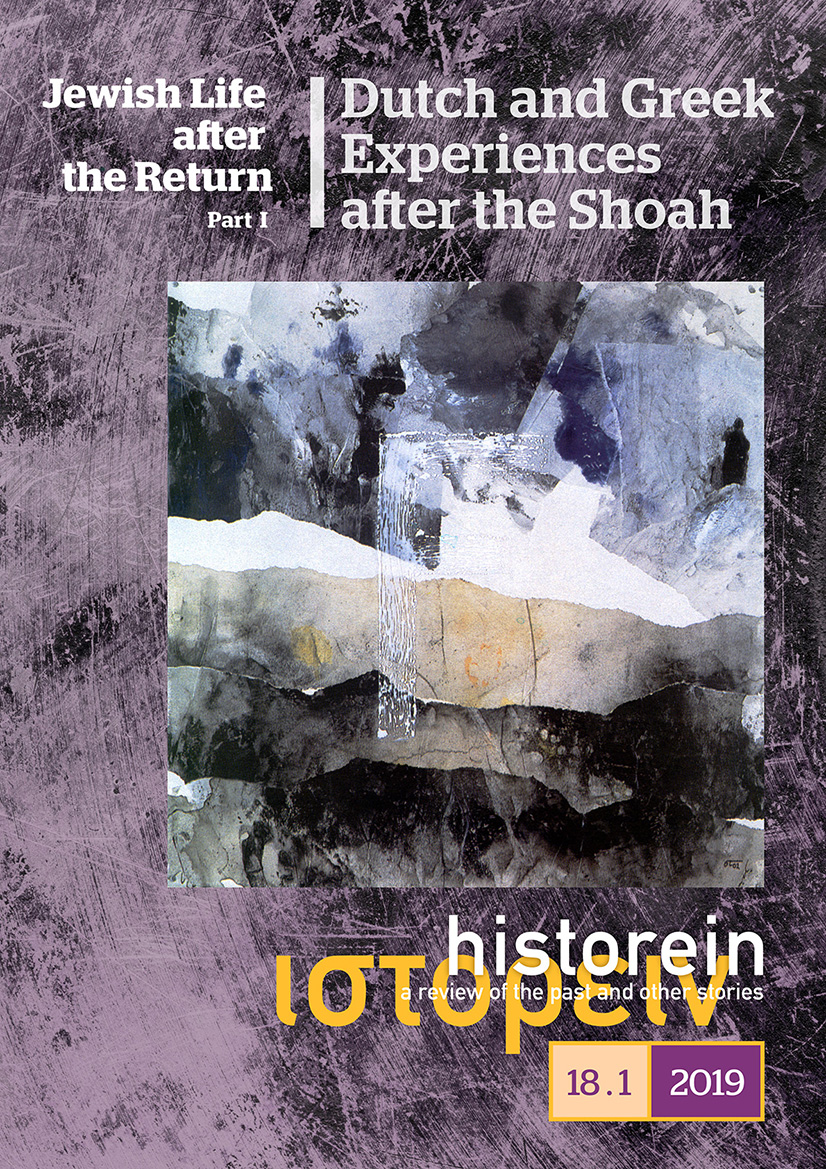My parents were killed in Sobibor, but it feels as if I was there: Imagination in my Interviews

Published:
Jun 19, 2019
Keywords:
Testimony Demjanjuk trial Holocaust Sobibor trauma
Abstract
During the Demjanjuk trial in Munich (2009–2011), I had the unexpected privilege to interview the Nebenkläger (co-plaintiffs) who testified in court about Sobibor. They related extremely sad stories about losing fathers, mothers, spouses and close family. In this article, I attempt to analyse their extreme loneliness and I wonder how to interpret their fragmented language of trauma. What kind of knowledge did they commit, and in what way are their stories different from the stories told by survivors?
Article Details
- How to Cite
-
Leydesdorff, S. (2019). My parents were killed in Sobibor, but it feels as if I was there: Imagination in my Interviews. Historein, 18(1). https://doi.org/10.12681/historein.14386
- Section
- ARTICLES

This work is licensed under a Creative Commons Attribution-NonCommercial-ShareAlike 4.0 International License.
The copyright for articles in this journal is retained by the author(s), with first publication rights granted to the journal. By virtue of their appearance in this open access journal, articles are free to use (with the exception of the non-granted right to make derivative works) with proper attribution for non-commercial uses (licence Creative Commons 4.0). EKT/NHRF retains the worldwide right to reproduce, display, distribute, and use articles published in Historein in all formats and media, either separately or as part of collective works for the full term of copyright. This includes but is not limited to the right to publish articles in an issue of the Journal, copy and distribute individual reprints of the articles, authorize reproduction of articles in their entirety in another EKT/NHRF publication, and authorize reproduction and distribution of articles or abstracts thereof by means of computerized retrieval systems.Downloads
Download data is not yet available.
References
Apfelbaum, Erika R. “And Now What, After Such Tribulations? Memory and Dislocation in the Era of Uprooting.” American Psychologist 55, no. 9 (2000): 1008–13.
Arad, Yitzhak. Belzec, Sobibor, Treblinka: The Operation Reinhard Death Camps. Bloomington: Indiana University Press, 1987.
Bem, Marek. Sobibor Extermination Camp, 1942–1943, translated by Tomasz Karpiński and Natalia Sarzyńska-Wójtowicz. Amsterdam: Stichting Sobibor, 2015.
Blatt, Thomas (Toivi). From the Ashes of Sobibor. Włodawa: Muzeum Pojezierza Łęczyńsko–Włodawskiego, 2008.
Bryant, Michael S. Eyewitness to Genocide: The Operation Reinhard Death Camp Trials, 1955–1966. Knoxville: University of Tennessee Press, 2014
Cohen, Eli. A. Negentien treinen naar Sobibor. Amsterdam: Lutingh Sijthof, 1979.
Dwork, Deborah. Children with a Star: Jewish Youth in Nazi Europe. New Haven: Yale University Press, 1991.
Felman, Shoshana, and Dori Laub. Testimony: Crises of Witnessing in Literature, Psychoanalysis and History. London: Routledge, 1991.
Greenfeld, Howard. The Hidden Children. New York: Ticknor & Fields, 1993.
Grossman, David. Falling Out of Time. London: Vintage, 2013.
Grossman, Vasily. The Road: Stories, Journalism, and Essays, edited and translated by Robert Chandler et al. New York: New York Review of Books, 2010.
Grossman, Vasily. With the Red Army in Poland and Byelorussia, translated by Helen Altschuler. London: Hutchinson, 1945.
Halbwachs, Maurice. Les cadres sociaux de la mémoire. Paris: Presses Universitaires de France, 1924.
Hirsch, Marianne. The Generation of Postmemory: Writing and Visual Culture After the Holocaust. New York: Columbia University Press, 2012.
Laub, Dori. “Bearing Witness or the Vicissitudes of Listening.” In Testimony: Crises of Witnessing in Literature, Psychoanalysis and History, edited by Shoshana Felman and Dori Laub. New York: Routledge, 1992.
Leydesdorff, Selma. “When All Is Lost: Metanarrative in the Oral History of Hanifa, Survivor of Srebrenica.” In Listening on the Edge: Oral History in the Aftermath of Crisis, edited by Mark Cave and Stephen M. Sloan, 17-32. New York: Oxford University Press, 2014.
Leydesdorff, Selma. Sasha Pechersky: Holocaust Hero, Sobibor Resistance Leader and Hostage of History. New York: Routledge, 2017.
Leydesdorff, Selma. Surviving the Bosnian Genocide: The Women of Srebrenica Speak. Bloomington: Indiana University Press, 2011.
Moskovitz, Sarah. Love Despite Hate: Child Survivors of the Holocaust and Their Adult Lives. New York: Schocken, 1983.
Novitch, Miriam. Sobibor, Martyrdom and Revolt. New York: Holocaust Library, 1980.
Rosenberg, Maxine B. Hiding to Survive: Stories of Jewish Children Rescued from the Holocaust. New York: Clarion, 1994.
Schelvis, Jules. Vernietigingskamp Sobibor. Amsterdam: De Bataafsche Leeuw, 1993.
Steiner, Georg. Language and Silence: Essays on Language, Literature, and the Inhuman. New York: Atheneum, 1967.
Ticho, Kurt. My Legacy, Holocaust, History and the Unfinished Task of Pope John Paul II. Włodawa: Muzeum Pojezierza Łęczyńsko–Włodawskiego, 2008.
Van der Kolk, Bessel. The Body Keeps the Score: Mind, Brain, and Body in the Transformation of Trauma. London: Penguin, 2014.
Wewryk, Kalmen. To Sobibor and Back. Włodawa: Muzeum Pojezierza Łęczyńsko–Włodawskiego, 2008.
Zielinski, Andrew. Conversations with Regina. Włodawa: Muzeum Pojezierza Łęczyńsko–Włodawskiego, 2008.


